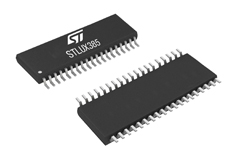Feb 12 2013
Domestic, commercial and public lighting systems can now be made greener, more economical, safer and more flexible, thanks to a unique device introduced by STMicroelectronics, a global semiconductor leader serving customers across the spectrum of electronics applications and a world leader in power-management solutions.
 STLUX385
STLUX385
The world's first programmable digital controller specifically optimized for lighting and power-supply applications, the new STLUX385 (Masterlux™ platform) simplifies the design of traditional power-conversion topologies, enabling faster development of innovative lighting systems.
The key to the new possibilities for improving the performance of LED, fluorescent and HID (High-Intensity Discharge) lighting systems is the STLUX385's combination of a proven, cost-effective STM8 microprocessor core and a unique set of peripherals aimed at simplifying the design of the lighting power supply and digital control of the lights. Depending on factors such as the lighting technology used, the input power source (AC or DC), dimming requirements and safety or reliability issues, many different types of power conversion and control topologies are required in the current and emerging lighting applications and the STLUX385 is the first device able to address all of these via a single programmable chip.
"More than 20% of the electricity generated is used to light our homes, streets, offices, factories and public areas, and making lighting more efficient is an essential step on the path towards a sustainable world," said Matteo Lo Presti, STMicroelectronics Group Vice President, Industrial & Power Conversion Division. "The STLUX385 distils 25 years of ST leadership in power conversion solutions into a single high value platform that customers can use to build more innovative and efficient lighting solutions."
The STLUX385 achieves this goal primarily by integrating six specially-designed peripherals called SMED (State Machine, Event-Driven) circuits that interact with each other and with external signals via a programmable switching matrix to control the power delivered to the lighting elements. In addition to the specific application signals, the SMEDs can process external commands to turn the lights on/off or set the dimming level, diagnostic signals such as open- or short-circuit detected, or inputs from sensors in applications where the lighting is designed to adapt to ambient conditions.
For example, this opens the way towards intelligent LED street lamps that increase their brightness gradually as daylight fades and, conversely, automatically reduce their brightness as the sun rises instead of having only a full brightness or off-setting at predetermined times.
The STLUX385 allows sophisticated lighting systems that currently require the use of expensive external Digital Signal Processors to be produced with shorter time-to-market and lower costs. It allows light quality and its perception to be improved through dedicated algorithms and energy saving through high-efficiency conversion algorithms, while allowing new interactions between the user and the lighting system.
In addition to the six SMED peripherals, the STLUX385 also integrates a hardware DALI (Digital Addressable Lighting Interface) peripheral. Digitally controlled lighting is the key to energy saving in building and outdoor lighting installations and the DALI protocol is now in international use across the lighting industry. The STLUX385 is compatible with wired or wireless communications, simplifying the installation in large indoor and outdoor areas and reducing maintenance costs.
The STLUX385 is available now in a compact TSSOP38 package at a price of US$2 in quantities of 1,000 units.
Technical Notes
- Six configurable PWM State Machine Event Driven (SMED) outputs with10.4ns resolution (up to 1.3ns using automatic dithering)
- DALI Slave HW peripheral
- -40 ºC to 105 ºC outdoor temperature range
- Four Analog Comparators synchronized with a 96MHz clock
- Six fast digital inputs synchronized with a 96MHz clock
- STM8 core-based (up to 20 MIPS)
- 8-channel, 10-bit ADC with programmable op-amp gain and sequencer
- 3V to 5.5V DC voltage supply